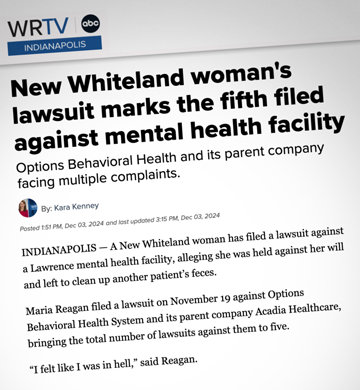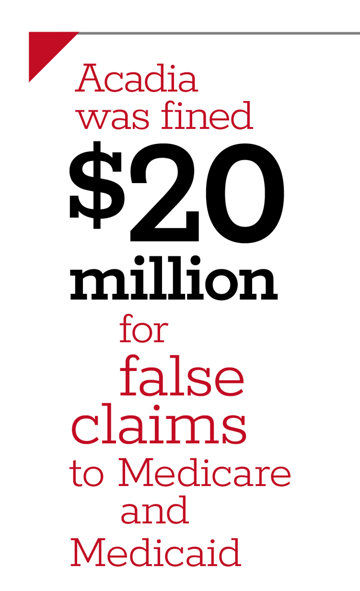What about two? Or three?
You might think that the plaintiffs are folks with mental issues after all. Maybe they’re confused about things, their “treatment” included.
Still, it does raise suspicions…
But five? Hands down, that facility is likely a hellhole. Or criminally crooked. Or both.
In fact, former patient Maria Reagan, who is suing the facility where she was imprisoned against her will, said, “I felt like I was in hell.”
Yes, hell. Welcome… to Options Behavioral Health Hospital in Indianapolis, part of the massive, nationwide psychiatric facilities firm Acadia Healthcare. Acadia has come under fire from both patients and employees for mistreatment, holding people against their will until their insurance runs out and threatening and bullying patients, all in hot pursuit of the almighty dollar.
“I felt like I was in the Twilight Zone—like where am I?”
What happens at Acadia facilities follows the same eerie pattern: Individuals suffering mental troubles go to the emergency room. From there, they are sent to Options Behavioral Health Hospital, where they discover they are locked in and not allowed to go home. From that point forward, they are treated like a cash crop.
That is, until the insurance money runs out. Then they are pronounced miraculously cured and shown the door.
Acadia, of course, gives the usual boilerplate denial: “We patently reject claims that Acadia places profits over patients—including inferences that we systematically hold patients longer than is medically necessary for financial reasons.”
Sure. Right. That’s your story and you’re sticking to it. Pull the other one, will you? Remember—five lawsuits.
Each suit has been filed by the firm Cohen and Malad, whose attorney, Justin Kuhn, put it this way: “We want this to stop. The practice of taking advantage of patients for monetary gain is absolutely deplorable and it should not happen.”
But happen it did and, at the nation’s mental health treatment facilities, it does—all the time.
Cohen and Malad, which specializes in healthcare and insurance malpractice, states on its website, “Acadia has been accused of using various tactics to extend patients’ stays, such as exaggerating symptoms or adjusting medication dosages to justify prolonged hospitalization. These extended stays, billed at rates of several thousand dollars a day, often continued until patients’ insurance coverage was exhausted.”
“All of [Acadia’s] actions suggest ‘let’s make money,’” Kuhn said. “We have people receiving injections, being restrained, being secluded, being held against their will.”

Reagan, for example, was expecting to stay for 72 hours but was stuck in Options for eight days. She says she never saw a psychiatrist.
Instead, the staff actually made her clean up after a patient who left diarrhea on the wall, the toilet and the door.
“I felt like I was in the Twilight Zone—like where am I?” she said. “The way I saw people get treated broke my heart.”
One of the lawsuits states that a 12-year-old girl was held against her will, got into three fights with another patient on the the same day and, instead of being relocated and protected, was given the dreaded “shot” with which Options patients are threatened—a mix of diphenhydramine, haloperidol and lorazepam that knocks you out and leaves you helpless for hours.
“They were tasked with keeping children safe and instead they incited violence,” the girl’s mother, Elizabeth Inman, said.
Inman’s lawsuit contains allegations of multiple criminal acts, including medical negligence, intentional infliction of emotional distress, willful and wanton conduct, racketeering activity, battery and failure to protect.
Dustin Fogt, another Options plaintiff, filed his lawsuit because he was beaten when he refused to turn over his watch, cellphone and passcode.
Indiana isn’t the only state with this problem. Acadia operates 258 facilities across 38 states—and it’s very big business indeed. The company is valued at about $7 billion and its CEO, Christopher H. Hunter, was paid over $7 million last year alone.
Sixteen patients told investigators that they had been kept there for no reason.
Seventy-two hours is the legal limit for holding patients against their will in Florida, but there’s just not enough money in 72-hour stays to keep Acadia happy. To extend that window, facilities must receive court approval, which is why, between 2019 and 2023, Acadia’s North Tampa Behavioral Health Hospital filed a whopping 4,500 court petitions to extend patient stays. Once a petition is filed, a facility can continue to bill insurance and that usually takes a few more very expensive, very profitable days.
Only 54 of North Tampa’s 4,500 petitions were approved, indicating that most of the requests were unnecessary at best and downright fraudulent at worst.
Lexie Reid, a former Acadia employee, said, “We were keeping people who didn’t need to be there.”

Of course, living outside the law is nothing new to Acadia; the company recently agreed to pay a nearly $20 million fine for submitting false claims to Medicare and Medicaid for unnecessary patient services. According to the Department of Justice, “Acadia admitted beneficiaries who were not eligible for inpatient treatment and failed to properly discharge beneficiaries when they no longer needed inpatient treatment, and had improper and excessive lengths of stay.”
After a police raid of an Acadia facility in Georgia, 16 patients told investigators that they had been kept there for no reason.
In Utah, Acadia’s Highland Ridge Hospital was closed after the state investigated reports of rapes and assaults—by the dozen.
Indiana Senator Andrea Hunley expressed concern about the difficulty of obtaining reports on inspections of Indiana’s psychiatric facilities by the state’s Family and Social Services Administration.
“It absolutely concerns me,” Hunley said. “We have an agency that is responsible for licensing, that is responsible for ensuring that we have high-quality care, that may not be happening.”
So remember, if you are ever unfortunate enough to find yourself in a psychiatric facility, locked down against your will, know that that’s not mental health care. It’s kidnapping, it’s imprisonment and it’s racketeering.
No matter what these people say—no matter their fancy words and noble-sounding jargon—in the end, they only care about the money.
They couldn’t care less about you.






















